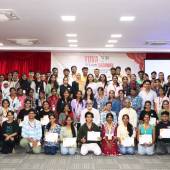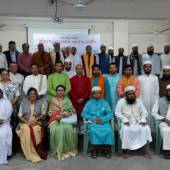World Congress of Leaders and the Future of Humanity
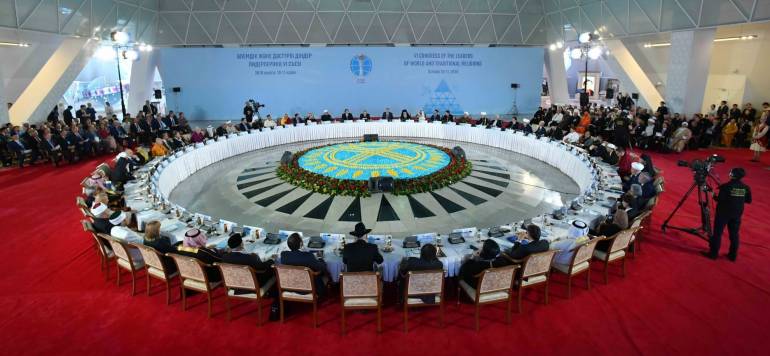
The Congress of Leaders of World and Traditional Religions is a unique interfaith forum, which gathers global religious, cultural, and political leaders, every three years in Astana, Kazakhstan.
Since the convening of the First Congress in 2003, at the initiative of Kazakhstan’s president Nursultan Nazarbayev, this forum has played an important role in searching for answers to the key challenges of our times, for the last 19 years.
The Congress is a venue of rich and constructive conversations among the leaders on the moral and spiritual obligation of the religious communities towards humanity. Each congress has a lead theme and produces a declaration addressed to all citizens, peoples, and governments of the countries of the world.
This international interreligious summit has demonstrated to the world the true vocation of all religions, cultures, and civilizations, and their enormous peacemaking and humanitarian potential, based on the commonality of moral and ethical principles.
Origins of the World Congress
Congress of Leaders of World and Traditional Religions was convened, for the first time, on September 23-24, 2003 on the initiative of the First President of the Republic of Kazakhstan, Nursultan Nazarbayev.
The event was in direct response to the rise in religious tensions and extremism following the 9/11 terrorist attack in the United States.
Speaking at the International Conference of Peace and Accord on February 13, 2003, which was attended by representatives of Christian, Muslim, and Jewish organizations, Nazarbayev apprised the representatives of all faiths with the initiative to hold the Congress of Leaders of the World and traditional religions in Kazakhstan.
We can also see the influence of the World Day of Prayer for Peace in Assisi organized by Pope John Paul II, first in 1986, and later on January 24, 2002, in which 200 other religious leaders were present, including Roman Catholic cardinals, Muslim clerics, Jewish rabbis, Buddhists, Sikhs, Baháʼís, Hindus, Jains, Zoroastrians and members of African traditional religions. Following the Terrorist attacks of September 11, 2001, the Assisi event intended to discourage making religion a motive for conflict in the 21st century.
Global leaders at the time believed that it was critical to create the opportunity for religious leaders to work together to prevent religion from being used to divide people, communities, and nations. It was important to counter the deliberate appeal of violent extremisms to young people.
The presence of high-profile attendees of previous Congresses like then UN Secretary-General Ban Ki-moon, President Shimon Peres of Israel, King Abdullah of Jordan, and others confirm the importance given to the congress by significant world leaders.
Priorities and Objectives of the Congress
The Congress functions as a permanent international interfaith institution for the dialogue of religions with a goal to search for the “common human landmarks” in the world and traditional religions.
Its main priorities include (1) the establishment of peace, harmony, and tolerance as the unshakable principles of human existence, (2) achieving mutual respect and tolerance, and (3) preventing the use of religious feelings of people for the escalation of conflicts and hostilities.
Each congress serves: (1) to deepen and strengthen mutual understanding and respect among communities; (2) to promote inter-religious and inter-confessional, and inter-cultural dialogue; (3) to develop a culture of tolerance and mutual respect as a counterbalance to the ideology of hatred and extremism; (4) to prevent the politicization of religions.

Chronology of the Congress
The six Congresses of Leaders of World and Traditional Religions were so far held in Astana, in 2003, 2006, 2009, 2012, 2015, and 2018, attended by leaders and prominent representatives of the clergy from Islam, Christianity, Judaism, Buddhism, Shintoism, Taoism, and other traditional religions as well as political leaders.
All the congresses so far were held in Astana, the capital of Kazakhstan, renamed Nur-Sultan in March 2019, only to be reverted to Astana in September 2022.
2003: First Congress was attended by 17 delegations from 23 countries and focused mainly on countering terrorism and religious extremism issues threatening world peace. On that occasion, Pope St. John Paul II, who had visited Kazakhstan in September 2001, sent a message to participants expressing hope that the initiative might help promote respect for human dignity and the protection of religious freedom.
2006: Second Congress, September 11-13, on the theme, “Freedom of religion and respect for representatives of other religions”.
2009: Third Congress, July 1-2, 2009, on the theme “Role of religious leaders in building the world based on tolerance, mutual respect and cooperation".
2012: Fourth Congress, May 30-31, on the theme «Peace and harmony as the choice of mankind»
2015: Fifth Congress, June 10-11, on the theme "Dialogue of religious leaders and political figures for peace and development»
2018: Sixth Congress, October 10-11, on the theme “Religious Leaders for a Safe World”. The number of attendees at the VI Congress increased almost fivefold compared to 2003, with 82 participating and with delegations from 46 states including well-known politicians, religious leaders of Islam, Christianity, Judaism, Hinduism, Taoism, Zoroastrianism as well as the representatives of international, religious and public organizations, such as the UN Alliance of Civilizations, OSCE, UNESCO, and the League of Arab States.
2022: Seventh Congress, September 14-15, Nur-Sultan (Astana) on the theme “The role of leaders of the world and traditional religions in the spiritual and social development of humanity in the post-pandemic period”
This year's Congress has some 100 participants from 50 countries, it will mark the greatest in the number of participants.
Pope Francis heads the Catholic delegation and will address the audience in the welcoming session and make the concluding statement. The UN Secretary-General António Guterres will give a video message.
Other dignitaries will include the Grand Imam of Al Azhar, Ahmed Al Tayyeb; Metropolitan Antonij of Volokolamsk, head of the Department for External Relations of the Patriarchate of Moscow; Ashkenazi Chief Rabbi of Israel David Lau; and Sephardic Chief Rabbi of Israel Yitzhak Yosef; and Patriarch Theophilos III of Jerusalem.
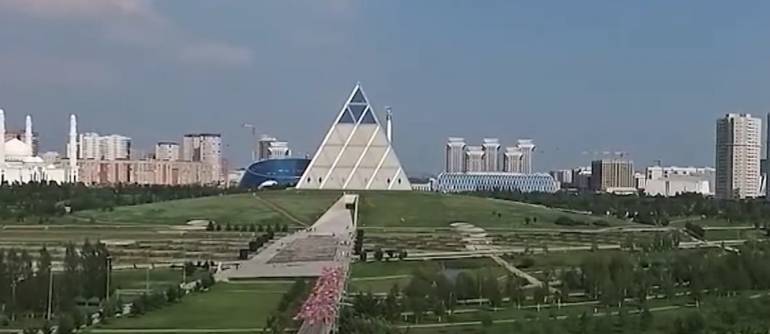
Astana or Nur-Sultan?
The World Congress of religious leaders takes place in Astana, the Capital of Kazakhstan, ever since its commencement.
Astana, which means capital in Kazakh, is a recently planned city sprawling with fanciful modern architecture. In 1997 Nazarbayev relocated the Kazakh capital from Almaty to Astana. The city has now become a centre of attraction for the whole world, as the Dubai of central Asia and as the ‘new Geneva’ for global issues by attracting international conferences, companies, UN agencies, NGOs, media, and other crucial players.
In 1999, the city was given the title 'City of Peace’ by UNESCO. Astana has gained the status of the City of Peace for serving as a venue for seeking the path of peaceful resolution of various disputes through meaningful negotiations based on the principles of mutual respect, non-interference, and shared responsibility for peace and security.
Astana has contributed to the (international) image of Kazakhstan as a multi-ethnic diverse country. The president constructed several religious buildings, like the Palace of Peace and Conciliation, also known as the Pyramid of Peace and Accord and the largest Jewish temple in Central Asia, in order to showcase that the country is religiously diverse and spiritually cultured and to show that the country attaches significance to the integration of its people.
Astana was renamed Nur-sultan in March 2019, in honor of outgoing president Nursultan Nazarbayev for three decades, by his successor Kazakhstan’s President Kassym-Jomart Tokayev.
However, just ahead of the seventh World Congress president Tokayev approved a proposal to restore the capital’s previous name Astana, following growing discontent with the government and the previous president, Nursultan Nazarbayev who was serving as security chief, which gave rise to January 2022 Kazakh unrest and crackdowns.
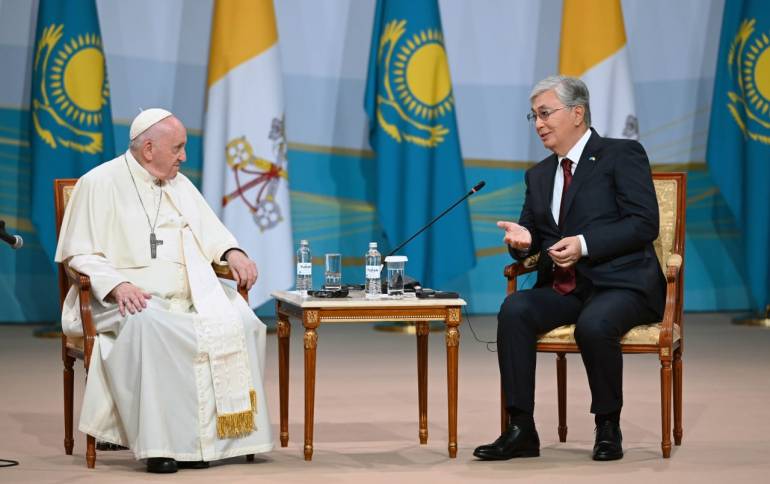
Catholic Church and the Congress
Since the country became independent from the former Soviet Union in 1992, Kazakhstan has had good relations with the Catholic Church. October 17, 2022, marks the 30th anniversary of the establishment of diplomatic relations between the Holy See and the Republic of Kazakhstan.
In 1998, Kazakhstan was the first country in Central Asia to sign an Agreement on Mutual Relations with the Holy See. Based on that Agreement, the cooperation between Holy See and Kazakhstan has been growing dynamically ever since. In 2001, Kazakhstan was the first country in Central Asia to be visited by Pope St. John Paul II, who traveled there under the motto “Love One Another.”
Deputy Prime Minister and Minister of Foreign Affairs of Kazakhstan, Mukhtar Tileuberdi, visited Vatican on May 30-31, 2022, and invited Pope to the Congress. During the visit two major Memorandums of Understanding, between the University Medical Centre of Kazakhstan and Bambino Gesù Hospital, and between the R.B. Suleimenov Institute of Eastern Studies and the Vatican Library, were signed.
Kazakhstan shares the global vision of the Catholic Church based on the ideals of goodness, justice, solidarity, and compassion. The Catholic Church welcomes Kazakhstan’s role in fostering intercultural and interreligious dialogue.
Pope Francis’ presence is the highlight of this year’s world congress of religions. Pope Francis' commitment to interreligious dialogue and friendship, as evidenced by his Document on Human Fraternity, signed in Abu Dhabi, and his subsequent encyclical on the topic in Fratelli tutti, will greatly influence the Congress members.
The World Congress of Leaders and the Future of Humanity
The world Congress has attracted more and more leaders each time. Each congress discussed a theme most relevant to the period and produced Declarations and Appeals addressed to citizens, peoples, and governments of the countries of the world.
What does it hold for the well-being and promotion of humanity?
For almost two decades the World Congress of Leaders has made a valuable contribution not only in interfaith and interethnic relations but also in the field of global security, particularly in the context of tackling religious extremism and terrorism.
By bringing religious, political, and cultural leaders together in a meaningful dialogue on ways to combine efforts to promote better understanding and respect among different religions, cultures, and societies, the Congress has advanced peace and solidarity.
Congress has facilitated tolerance and mutual respect in contrast to the ideology of hatred and extremism through global dialogue between religions and nations.
Its contribution to promoting dialogue and understanding was recognized in 2004 by a United Nations General Assembly Resolution. Likewise, at the initiative of the Congress, the 62nd session of the UN General Assembly declared 2010 the International Year for the Rapprochement of Cultures.
As a dialogue platform for constructive conversation, Congress provides a beacon of hope for humanity, which is tormented by a diminishing level of respect for the sacred gift of human life and dignity.
Serious challenges to global stability due to poverty, hunger, illiteracy, disease, and immorality along with growing disparity of wealth and increasing use of brutality and violence as the main tools for resolving disputes, religious extremism and terrorism, and the looming ecological crisis adds to the woes of humanity.
The Congress of leaders of the world and traditional religions gathered in Kazakhstan will not have answers or solutions to all the problems faced by humanity, but the willingness of so many world leaders to go there is a clear indication that the promotion of values such as tolerance, truth, justice, and love is the only way for assuring a prosperous future for humans in the 21st century.
Radio Veritas Asia (RVA), a media platform of the Catholic Church, aims to share Christ. RVA started in 1969 as a continental Catholic radio station to serve Asian countries in their respective local language, thus earning the tag “the Voice of Asian Christianity.” Responding to the emerging context, RVA embraced media platforms to connect with the global Asian audience via its 21 language websites and various social media platforms.









